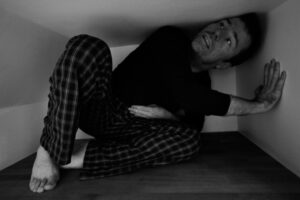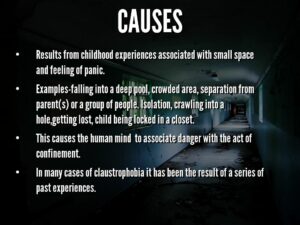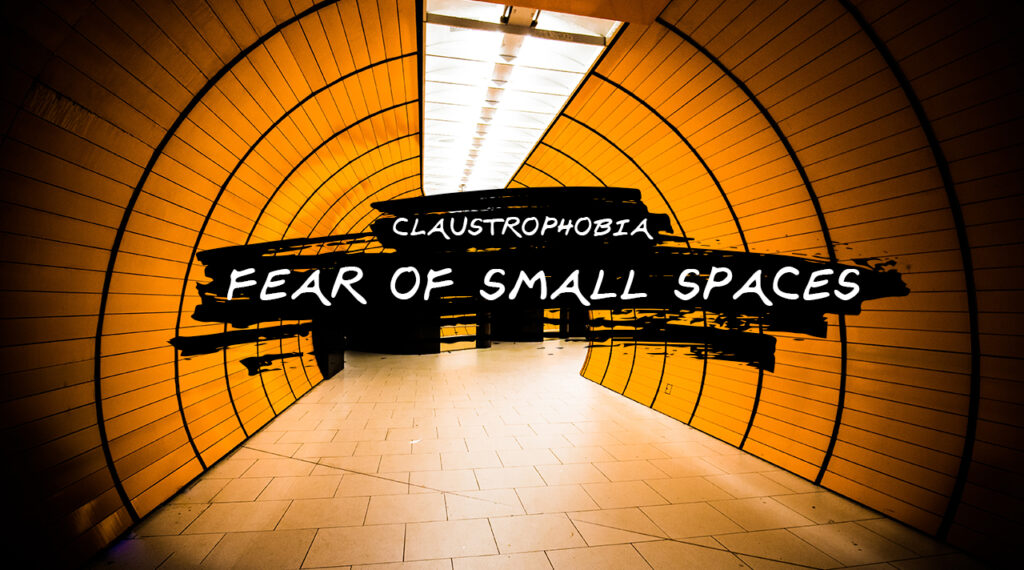Contents
What Is Claustrophobia?

Claustrophobia is the fear of enclosed or small spaces. This condition can be triggered by many things, such as tight spaces, being in a crowd, or being on an elevator. For some people, claustrophobia can be debilitating and lead to panic attacks.
Claustrophobia is the fear of enclosed or small spaces. This condition can be triggered by many things, such as tight spaces, being in a crowd, or being on an elevator. For some people, claustrophobia can be debilitating and lead to panic attacks.
Who Gets Claustrophobia?
This phobia is fairly common among adults. It is estimated that up to 6% of the population has this phobia. But it often goes unreported because the sufferers may go to great lengths to avoid situations that cause them distress. Some cases are known to have developed after a traumatic incident involving confinement, darkness, or crowding. Though there are also strong genetic components to this condition.
Symptoms Of Claustrophobic Disorders
The symptoms of claustrophobia vary between individuals. Some people can simply feel uncomfortable in small spaces. Whereas others may have a full-blown panic attack at the mere thought of being enclosed. Symptoms may include:

- Tightness in the throat
- Shortness of breath
- Increased heart rate and/or blood pressure
- Nausea and dizziness
- Chest pain or discomfort
- Feeling trapped, helpless, and/or scared
If you experience any of these symptoms while attempting to navigate a small space, it is possible that you have claustrophobia.
By working with your doctor and reducing your symptoms, you will be able to continue living normally despite this condition. If necessary, minor surgery may be performed to relieve some symptoms of claustrophobia. For example, the removal of the vocal cords may help to alleviate a person’s fears about having a panic attack in small spaces. This would not be a cure for claustrophobia, but rather a treatment option for severe cases.
Causes Of Claustrophobia

Many people are born with this condition; it can also be caused by a traumatic experience. Some common causes of claustrophobia include:
- A traumatic incident involves being trapped or stuck in a tight space, such as being closed inside a coffin or a suitcase.
- Fear of the dark, which some sufferers associate with being trapped and unable to escape from tight spaces.
- A fear of crowds, which is sometimes associated with the fear of being trapped or unable to get out of an enclosed space.
In order to properly treat this condition, you must first understand the root cause of your symptoms. Talk to your doctor for more information.
How To Cope With Claustrophobia?

Exposing yourself gradually to the source of your distress is also essential for treatment. This might mean taking small steps towards overcoming claustrophobia including:
- Slowly spending time with family or friends in smaller and smaller locations
- Using public transportation or riding on highways by yourself
- Practicing breathing exercises if you are having panic attacks
- Make sure you are aware of what triggers your claustrophobia, whether it is taking crowded subway trains, being in small elevators, or enclosed spaces like movie theaters and planes.
- Next time you experience a trigger (i.e., standing on an uncomfortably crowded subway platform), take a deep breath and say to yourself that you can get through this.
- If you are already in the situation that triggers your claustrophobia, there are some things you can do to cope with it: try not to fixate on what is triggering you by thinking about something else, find a focal point (i.e., a clock or an object) if your mind starts wandering or panicking, don’t hold onto any objects for support because they could cause a panic attack down the road, and think of how light your body feels rather than how heavy – this way, it’ll feel like gravity is pulling you away from the ground instead of pushing you flat against it.
- Remember that it is possible to overcome any phobia and that you have done it before even if the fear was not as severe as claustrophobia.
How to Avoid Triggering a Panic Attack?

1. When going into a crowded place or being on an elevator, take slow deep breaths so your body feels relaxed and calm.
2. Remind yourself of all the times you’ve been in crowded places without triggering a panic attack – remember those times so your mind knows that you can handle the current situation as well.
3. If you find yourself panicking at home for no reason, go out into the public as soon as possible to redirect your stress from whatever triggered it initially to something else (i.e., talking to strangers).
4. Knowing what triggers your claustrophobia — airplanes, small rooms, or crowds
5. Using visualization exercises that will help you imagine something positive (i.e., flying in the air like an airplane) when triggered by a situation that causes severe panic
6. Reassuring yourself that you are safe and not trapped in the situation because you can always ask for assistance if necessary
7. Changing the way you think about claustrophobic situations, allowing yourself to see them in a less threatening light at home. This will increase their confidence and decrease the chances that they will have severe panic attacks when in public places.
Claustrophobia is a severe phobia that can cause severe panic attacks and distress for those living with it. It’s important that you take the first steps towards overcoming claustrophobia as soon as possible to live a normal, healthy life!
How To Help Someone Who Has Claustrophobia?

When someone you know is struggling with claustrophobia, it can be difficult to know how to help them. A few tips include:
- Reassure them that they are safe and that you are there for them.
- Help them to gradually expose themselves to the situations or places that cause them anxiety.
- If they are having a panic attack, talk to them calmly and guide them through some deep breathing exercises.
- Remind them that they can overcome their fear, and offer words of encouragement.
- Remember that sometimes the best thing you can do is to just listen!
- Make sure you are aware of what triggers their Claustrophobia. Some people fear small rooms, closed in spaces which cause them not to be able to escape quickly if necessary
- Let your loved ones know that you are there for them no matter what happens
- Help your loved ones gradually expose themselves to the situation that causes them anxiety by starting off slow and building up over time
- Offer words of encouragement along the way because sometimes positive reinforcement is enough to help carry out a task
- Claustrophobia is a psychological condition that can be overcome through therapy, counseling, and exposure to the source of anxiety.
Treatment Options for Claustrophobia
There are many treatment options for claustrophobia that include medication and therapy. Experts recommend treatment when the condition is debilitating, which is when it prevents an individual from going to work or attending school.
While there are no medications to treat claustrophobia specifically, anxiety-reducing drugs can be beneficial to some sufferers. Psychotherapy is also helpful because it allows patients to express their feelings and fears about the condition while working with a therapist to develop coping techniques for specific triggers.
Therapy

Cognitive Behavioral Therapy (CBT) involves learning to identify and correct negative thought patterns that contribute to your fears. Exposure therapy, which is used in CBT, gradually exposes you to the thing you fear. So that your brain can become desensitized to it and the panic attacks stop.
CBT does not necessarily mean going to a cognitive therapist. You can start practicing CBT by journaling about negative thought patterns you have and how you might challenge them. Or by telling yourself positive affirmations every day.
Medication
There are currently no medications approved for the treatment of claustrophobia, but some studies have been conducted on using the medication as a supplement to therapy. One study, which focused specifically on the use of d-cycloserine (DCS) in conjunction with exposure therapy, showed that participants who were given DCS experienced greater benefit from exposure therapy than those who took it during sessions but did not take it otherwise.
SSRIs or serotonin reuptake inhibitors are antidepressant medications that calm the nervous system and reduce anxiety levels while buspirone treats anxiety by working on certain neurotransmitters in the brain such as serotonin and dopamine (NCBI). At high doses, benzodiazepines like Xanax can also be prescribed. But should only be done under a doctor’s supervision because of the risk of dependence.
Breathing Techniques
There are many breathing techniques that can be used to calm the heart rate when you feel a panic attack coming on. So it is best to try out different ones to see which one works for you.
These breathing techniques are-
Deep breathing: You can do deep breathing by inhaling through your nose, holding it for a few seconds. And then exhaling slowly through your mouth, which should lower your heart rate.
Progressive muscle relaxation: This is when you tense up all the muscles in your body one by one and then release them until you’re completely in a good state.
These are just some of the treatment options available for claustrophobia. If you find that you are experiencing constant distress or panic attacks, speak to your doctor about receiving a prescription for an anxiety-reducing medication. These can help you to feel more comfortable in confined spaces without the fear of triggering an attack.
Lifestyle Changes

There are many different treatments for Claustrophobia that can be helpful. In addition, you can make some lifestyle changes such as:
- Reminding yourself that the anxiety is only temporary and will pass eventually even if it feels severe at times
- Reassure yourself that you cannot get stuck no matter how hard you try because there is always someone available to help rescue you
- Visualizing something positive (i.e., flying in the air like an airplane) when triggered by a situation that causes severe claustrophobic symptoms
- Finding support from family, friends, and peers who are understanding about your condition
- Removing yourself from the situation that is causing you anxiety as soon as you can in order to avoid an outbreak of symptoms
- Seek help from a therapist or doctor if you are finding it difficult to overcome your Claustrophobia by yourself.
- If you have any questions about your symptoms or treatment plan for claustrophobia, contact your doctor today!
Conclusion
In conclusion, it is important to know that claustrophobia does not have a cure. The best way to manage the phobia of being closed in an enclosed space for too long is by avoiding them at all costs. If you are experiencing any symptoms of this disorder. Please contact your physician or psychologist right away. So they can help guide you through the process and find more effective treatments. This article may be able to provide some relief with its resources on coping mechanisms. And other helpful hints but will not do anything about fixing what has already happened if left untreated.
If you are looking for affordable Online Counseling MantraCare can help: Book a trial therapy session


